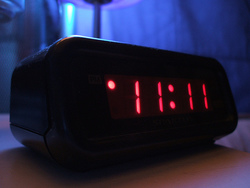Digital sum
 The
digital root
of a number is obtained by adding together the digits of that number, and repeating that process until a number is arrived at that is less than
.
The
digital root
of a number is obtained by adding together the digits of that number, and repeating that process until a number is arrived at that is less than
.
For example,for the digital root is .
Let be the number of all positive integers less than one million that have a digital root of . What is the digital root of ?
Check out part 2 for a more challenging version
The answer is 6.
This section requires Javascript.
You are seeing this because something didn't load right. We suggest you, (a) try
refreshing the page, (b) enabling javascript if it is disabled on your browser and,
finally, (c)
loading the
non-javascript version of this page
. We're sorry about the hassle.
Digital root of S is congruent to S mod 9. So no.of no.s less than 1 million which are 1 mod 9 are 9 1 0 0 0 0 0 0 − 1 = 111111 =S which is congruent to 6 mod 9.